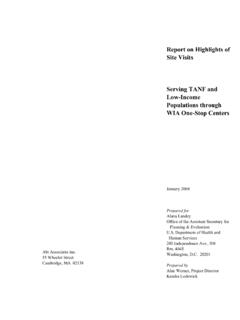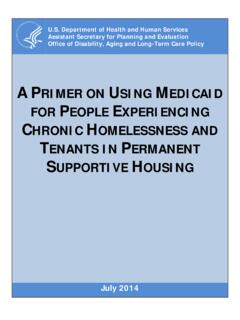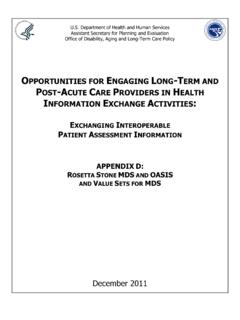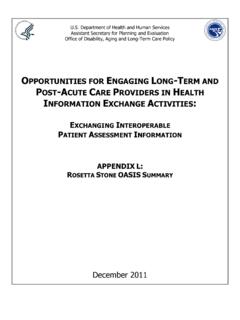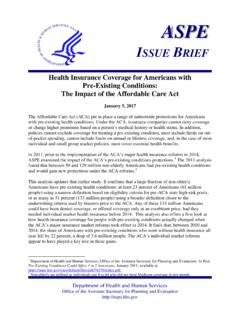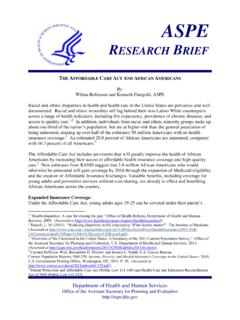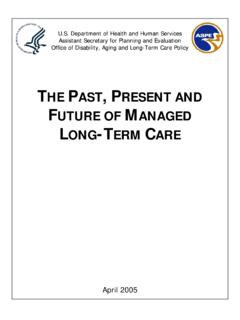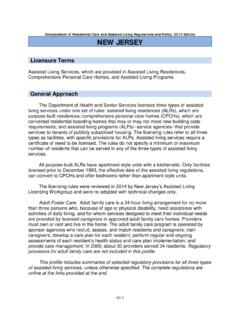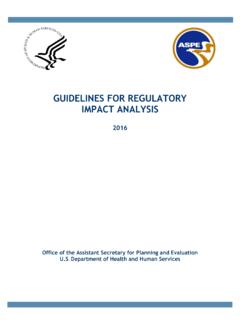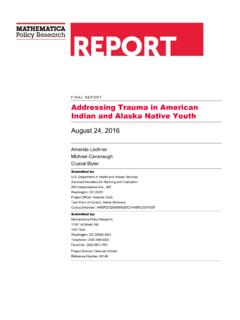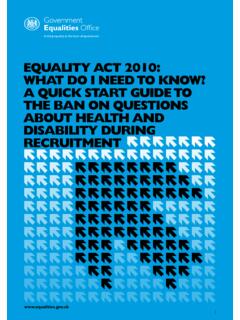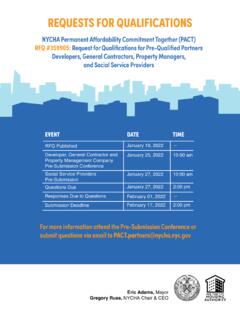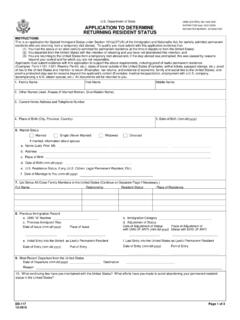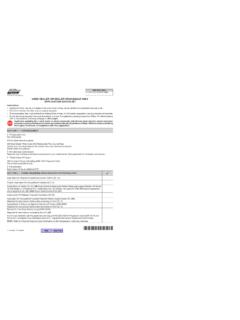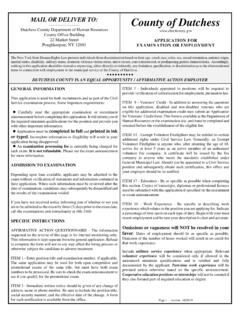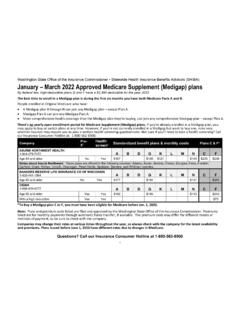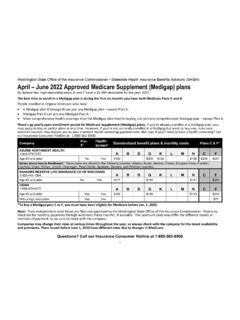Transcription of Residential Care/Assisted Living Compendium: Illinois - ASPE
1 Compendium of Residential Care and assisted Living Regulations and Policy: 2015 Edition Illinois . Licensure Terms assisted Living Establishment, Shared Housing Establishment, Sheltered Care Facility, and Supportive Living Facility General Approach The Illinois Department of Public Health regulates assisted Living establishments and shared housing establishments through one set of rules; assisted Living requires single-occupancy private apartment units and shared housing does not. Sheltered care facilities are licensed under the Nursing Home Care Act to provide personal care services and are typically co-located with a nursing facility. Supportive Living facilities are certified by the Department of Healthcare and Family Services to provide Residential care and supportive services to either low-income older adults or younger adults with disabilities who are eligible for Medicaid.
2 Facilities must designate which of these two populations it will serve. There is no separate licensure category for adult foster care. This profile includes summaries of selected regulatory provisions for assisted Living establishments, shared housing establishments, sheltered care facilities, and supportive Living programs. The complete regulations are online at the links provided at the end. Definitions assisted Living establishment means a residence for three or more unrelated adults (at least 80 percent of whom are 55 years of age or older) that provides single- occupancy Living units with a private bathroom and space for small kitchen appliances. Residents should be able to age in place within the parameters set by the licensing rules. Shared housing establishment means a publicly or privately operated freestanding residence for 3-16 adults (at least 80 percent of whom are 55 years of age or older) who are unrelated to the facility owners and/or managers.
3 Shared housing provides the same services as assisted Living . Sheltered care facilities provide maintenance and personal care but do not provide routine nursing care. IL-1. Supportive Living facilities are Residential settings that provide or coordinate personal care services, 24-hour supervision and assistance (scheduled and unscheduled), activities, and health-related services. Facilities must be designed and operated to minimize the need for residents to move within or from the setting. resident Agreements assisted Living and Shared Housing Establishments. resident agreements must provide information about the contract duration; the base rate and services included; additional services available and their cost; the complaint resolution process;. residents' rights and obligations; billing and payment procedures; admission, risk management, and termination policies and procedures; the Department's annual on-site review process; terms of occupancy; payment and refund policies; notice requirements for fee changes; and policies for notifying relatives about changes in the resident 's condition.
4 Sheltered Care Facilities. resident agreements must include information about services and charges; residents' rights and obligations; whether the facility accepts Medicaid; and termination policies. Supportive Living Facilities. resident agreements must describe the services provided under Medicaid; payment arrangements; grievance procedures; termination provisions; and residents' rights. The agreement includes services available for an additional fee and arrangements for sharing units. Disclosure Provisions The following rule applies to all settings. A facility that offers to provide care for persons with Alzheimer's disease and other dementias through an Alzheimer's special care unit or center must disclose to the state agency responsible for licensing or certification--and to a potential or actual resident of the facility or such a resident 's representative--the following information in writing: Form of care or treatment that distinguishes the facility as suitable for persons with Alzheimer's disease and other dementias.
5 Philosophy of the facility concerning the care or treatment of persons with Alzheimer's disease and other dementias. Facility's pre-admission, admission, and discharge procedures. IL-2. Facility's assessment, care planning, and implementation guidelines in the care and treatment of persons with Alzheimer's disease and other dementias. Facility's minimum and maximum staffing ratios, specifying the general licensed health care provider-to- resident ratio and the trainee health care provider-to- resident ratio. Facility's physical environment. Activities available to residents at the facility. Role of family members in the care of residents at the facility. Costs of care and treatment under the program or at the center. Admission and Retention Policy assisted Living and Shared Housing Establishments. Facilities may not admit or retain residents who are a danger to themselves or others; are not able to communicate their needs and do not have a representative residing in the facility.
6 Require total assistance with two or more activities of daily Living (ADLs); require assistance of more than one paid caregiver with any ADL; or require more than minimal assistance in moving to a safe area in an emergency. Persons with severe mental illness may not be admitted. Facilities may not admit or retain residents who need the following health services unless self-administered or administered by a qualified licensed health care professional who is not employed by the facility owner or operator: intravenous (IV) therapy or feedings; gastrostomy feedings; catheters, except for routine maintenance of urinary catheters; sterile wound care; sliding scale insulin; routine insulin injections; and Stage III or IV decubitus ulcers. Residents may not be accepted who need five or more skilled nursing visits a week for 3 or more weeks unless the course of treatment is rehabilitative and the need is temporary.
7 An exception to these admission and discharge provisions is made for terminally ill individuals who are receiving or would qualify for hospice care provided by a licensed hospice provider. Facilities may not serve people with dementia whose mental or physical condition is detrimental to the health, welfare, or safety of the resident or other residents, as determined by the resident 's physician prior to admission and annually thereafter. Sheltered Care Facilities. Persons needing nursing care; or who have a communicable disease; or who are mentally ill, need treatment for mental illness, are IL-3. likely to harm self or others; or who are destructive of property may not be admitted or retained. Supportive Living facilities may serve residents age 22 or older who have been screened and determined to meet Department-defined eligibility criteria. applicants must have their name checked against the sex offender registry data base.
8 Residents may be discharged if they are a danger to self or others or have needs that the facility cannot meet. Residents, with the exception of a spouse or significant other, must have a dementia diagnosis from a physician. Services assisted Living and Shared Housing Establishments. Mandatory services include housekeeping, laundry, security, emergency response systems, and assistance with ADLs. Optional services include medication reminders, supervision of self- administered medications, medication administration, and non-medical services. Facilities must ensure that residents have the right to direct the scope of services they receive and to make individual choices based on their needs and preferences. Establishments must be operated in a manner that provides the least restrictive and most home-like environment and that promotes independence, autonomy, individuality, privacy, dignity, and the right to negotiate risk-taking in Residential surroundings.
9 Sheltered Care Facilities. Facilities may provide personal care; group and individual activities, including restorative and therapeutic activities; medical services;. and assistance with self-administration of medications or administration by a physician or licensed nurse. Supportive Living facilities must provide personal and health-related services, including nursing services; personal care; medication oversight and assistance in self- administration; social and recreational programs; 24-hour response/security staff;. emergency call systems; health promotion and referral; exercise; transportation; daily checks; and maintenance services. Nursing services include resident assessment and service planning; a quarterly health status evaluation; administration of medication when residents are temporarily unable to self-administer; medication setup; health counseling.
10 Episodic and intermittent health promotion or disease prevention counseling; and teaching self-care to meet routine and special health care needs. Service Planning assisted Living and Shared Housing Establishments. A comprehensive assessment that includes an evaluation of a prospective resident 's physical, cognitive, and psychosocial condition must be completed by a physician. This assessment must be updated by a physician annually or upon a significant change in condition. IL-4. Negotiated risk is described as a process by which a resident , or his or her representative, may formally negotiate with providers what risks each are willing and unwilling to assume in service provision and the resident 's Living environment. The provider must ensure that the resident and the resident 's representative, if any, are informed of the potential consequences of activities that the provider considers to pose risks to health and/or safety.
